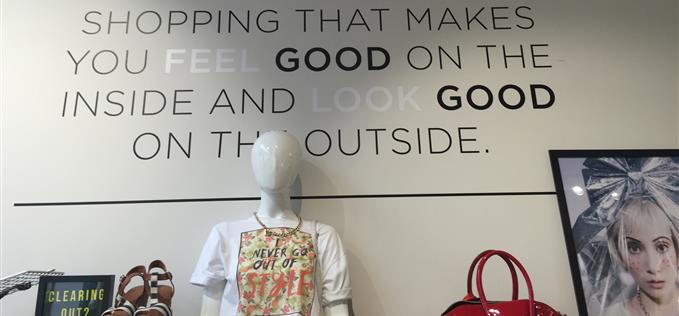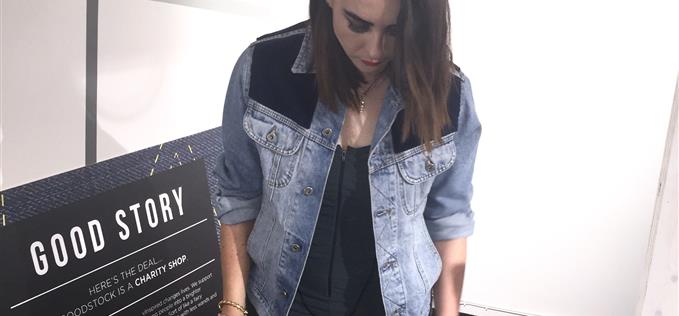WE LIKE our fashion the way we like our 3am post-night-out feasts: fast and cheap - with an extra portion of ‘très chic’ for good measure.
Surely we’d be willing to pay more for our goods to ensure we aren’t taking from people who can’t afford to lose money?
Let's meander along Market Street: you’re dazzled by all the end of season sales and enticed by the hipster-haunts drawing you in with a promise of an extra 20% off original markdowns. Our online favourite Missguided is now in Selfridges, moving from just our online flirtation to our favourite pay-day concession-destination. Temptation to shop excessively is certainly rich in the city - and that we do.
Earlier this year many of us watched Andrew Morgan's documentary, The True Cost, detailing the conditions in the factories where our fast fashion is made; no doubt some of us were horrified and vowed ‘never again’ to shop at high-street favourites, such as Primark.
Yet we still seem to conveniently leave our horror at the automatic doors when we see a tassel-suedette jacket for half the price of its slightly more fancy and frou-frou sister, Topshop. Did we ever care in the first place, or were we temporarily blinded by our immediate need to look like a Mancunian Kate Moss?
 Do we really care where our good come from?
Do we really care where our good come from?Who really pays the price of fashion? You’d be inclined to say ‘Well, me’ - after all, when you key in your four digits in exchange for your bag of goodies, it's money out your purse. Yet facing the hard facts, it definitely isn’t you who's fronting the real cost. And it definitely isn’t Primark either.
The fast-fashion empire reported an 11% rise in profits for the first half of the year, and confirmed they’re on track to take over the world (well America, and the rest of Europe) with profits up by £213 million. In stark contrast, Morgan’s documentary showed the thirteen countries facing the brutish effects of retail exploitation. Hardship and poverty is rife in third world factories. This is the far uglier reality of fashion.
‘What do you expect me to do about it?’, I hear you say.
Ethics and fashion aren’t friends nor are they foes; they’re awkward acquaintances. With more retailers like the ASOS Green Room and Stella McCartney championing fashion with a conscience, it's time for us to ‘click-away’ from their less ethical counterparts.
Manchester is swarmed with opportunities to delve into the depths of fashion.
Here, we have the vintage shops in the Northern Quarter interspersed with all the other independent stores, featuring ‘Kilo Vintage sales’. Manchester is fashion-forward, progressive and edgy with trinkets of the past. When we buy ‘vintage, darling’ pieces we avoid the question of whether a child in a developing country worked until 10pm to make our skirt a few months before it took up residence in our wardrobe. You can buy your wardrobe staples knowing full-well that no harm has been done - you can walk away with bags full and a clear conscience.
 Goodstock, Manchester
Goodstock, ManchesterYou can also take ethical shopping a step further with stores like Goodstock on Manchester’s Oxford Road.
Goodstock’s not just your average charity shop. First off, it doesn’t look like one and inside forms a charity shop with a difference.
Grace, the manager of the store on Oxford Road explained to me why Vinspired (the charity behind Goodstock) are different:
"Vinspired are a youth volunteering charity who aim to help young people develop new skills, confidence and experience to aid them in finding employment. As we are a youth charity, we wanted our shops to be a game changing, youth relevant take on charity retail and Goodstock definitely is."
When you shop at Goodstock, you’re also giving to a charity that funds and encourages young people to pursue entrepreneurial projects. As well as that, all the staff on the shop floor are volunteers. Spending your money is actively helping people long after the clothes were first made and it brings a whole new dimension to the term ‘ethical fashion’: the money doesn’t make the rich richer. Instead it gives opportunities to the people that have the power to influence their own futures.
And it’s a fresh take on the image of charity shops as basically being full of your nan’s old sweaters and plaid skirts. I decided to take a wander around the shop last week and see what I could find. I found a Marc Jacobs dress for £25, an evening dress from Monsoon for £15, a brand new Armani handbag for £25 and so many shoes of different sizes and colours. Then one of the staff helped me to find an outfit worthy of a ‘hipster’ (I don’t claim to be one of those). I ended up in a unitard (yours for £15), an oversized denim jacket (£18) and a pair of black heeled boots (£8). Apparently, I looked alternative enough to pass as a Northern Quarter edgy fashion-forward type...
 Amirah wears Goodstock
Amirah wears GoodstockA few months ago the shop took part in a Fashion Revolution flash mob in collaboration with MMU, and also created a window display full of inside out clothes based around the question 'Who made my clothes?'
Grace explained: "As well as supporting young people, Goodstock customers are also supporting ethical fashion by shopping our pre-loved fashions and recycling clothing.
"The people in Manchester are becoming more and more aware of these issues and it's great to see people of all ages supporting Goodstock and other ethical fashion projects like MMU Pop swap and Stitched Up."
With shops like Goodstock, is it such a dilemma to boycott our favourite fast-fashion stores when the ethical cons outweigh the pros?
Popular store American Apparel pay their staff up to 50 times more than their competition; a garment worker in Bangladesh earns $600 a year and garment workers at American Apparel earn $30,000 plus benefits. This is the bigger picture.
Surely we’d be willing to pay more for our goods to ensure we aren’t taking from people who can’t afford to lose money?
Follow @MissAmerkat on Twitter
Find Goodstock, Manchester at 6a Oxford Road, Manchester M15QA.



